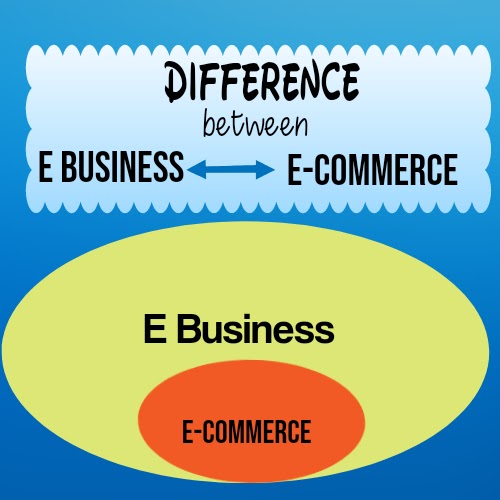 |
| E-business v/s E-commerce |
Some people associate the terms “e-business” and “e-commerce” with the same meaning, but they are different. The term e-commerce refers to a business model that allows companies and individuals to buy and sell goods and services on the Internet. The term e-commerce has become very broad in its meaning. E-commerce works in many areas and can be run on smartphones, tablets, computers, and other digital devices. Almost everything for sale today is available online through e-commerce. We see e-commerce as part of e-business. Using the web for at least part of the life cycle of any business transaction is called e-commerce.
E-commerce is split up into three areas: online retailers, electronic markets, and online auctions. E-commerce is booming because of the convenience of online shopping and online payment. This feature saves busy people time and money.
E-business is the completion of an online business on the web, the Internet, extranet, or a combination thereof. These include managing production and supply chains, collaborating with business partners, sharing information, running automated employee services, and hiring employees.
E-business is like e-commerce but involves more functions and services than online shopping transactions.
Electronic business differs from e-commerce because it deals not only with the online transaction of buying and selling a product or service but also with business processes involving inbound/outbound logistics, manufacturing and operations, marketing and sales, and customer service to enable running. Within the value chain through internal or external networks, IBM’s marketing team coined the term “e-business” in 1996.
If you want to set up an Internet-based company or plan to work together, you need to understand the difference between e-commerce and e-business, the basic terms, and how it works. You can learn digital skills related to e-commerce through online content. Thanks to the development of the internet, it has become easy to learn digital skills content online.
Overview of e-Business.
E-business, often known as an online business, refers to commercial activities conducted over the internet. In the year 1996, the phrase "e-business" first appeared. Electronic business is referred to as e-business. As a result, the buyer and vendor are not in person.
We are exposed to a variety of e-Business models in today's environment. Since its emergence, it has thrived by leaps and bounds. Some believe that it may soon entirely replace brick and mortar retailers. While that is still up in the air, we cannot discount the significant part it currently plays in the world economy.
It could be difficult to identify companies that are genuine e-businesses in today's tech-driven society. Using examples may be the most effective technique to understand e-business.
- Emails are one of the most widely used forms of digital communication, which is primarily why employing them for marketing purposes can be so successful. They aid in exploding user engagement, fostering consumer loyalty, disseminating helpful knowledge, announcing the hottest discounts, and increasing sales. For an e-business to succeed, email marketing is essential. The advantages of using successful email campaigns are enormous. Email marketing enables the expansion of brand recognition, the creation of credibility, and the creation of relationships of trust with customers. Additionally, it is a great way to increase traffic to your website, increase sales, and generate prospects.
- E-businesses create and market online systems that track inventories and provide warnings when certain levels are reached. As a business process that can be facilitated electronically, inventory management is included in e-business.
- Another illustration of e-business is a content management system that controls the workflow between a content developer, editor, manager, and publisher. Without an electronic workflow, this procedure would be carried out by physically moving paper files. It becomes an e-business when it is facilitated electronically.
An e-business can create online tools for human resources. Online job boards, applications processors, and systems that compile and retain personnel data are some of these tools.
A lot of what is referred to as e-business operations may be carried out internally through a company's network or may be outsourced to a provider that specializes in the required service. Standard firms may incorporate some aspects of e-business into their strategy by creating them internally; the two types of enterprises are not exclusive.
The way business is conducted can often be the only distinction between a traditional firm and an e-enterprise. A business might be, for instance, an advising firm that assists clients in selecting the appropriate furniture, but an e-business would be a website that allows clients to compare available possibilities.
Overview of E-Commerce.
E-definition commerce is more precise than that e-business. In its most basic form, it entails making payments and orders online. There are various sorts of e-commerce. In business-to-consumer (B2C) e-commerce, a company uses its website to sell products and services to customers. Numerous traditional brick-and-mortar retailers have adapted to the growth of e-commerce and now offer products for sale both online and in-person.
Every component of a sale, including placing an order, paying for it, and receiving it, can be included in an e-commerce transaction. A portion of the process can also not be included. Online or orders product to be picked up in-store, for instance, might be made by a customer. When picking up the item, payment can be made in person or online. In either case, e-commerce was a part of the transaction.
In addition to their websites, a lot of firms now sell through online marketplaces. For instance, a well-known company like Nike will sell shoes both directly from its website and through an online merchant like Amazon. E-commerce is still being practiced whether you purchase it from Amazon or Nike's website.
Electronic commerce between businesses (B2B)
The majority of global e-commerce comprises B2-B relationships, even though the average customer may not be aware of this. This kind of e-commerce frequently entails transactions like replenishing essential supplies, and it is frequently automated. For instance, a landscaping business might have a deal with an online retailer to keep fertilizer, gardening shears, and gloves in stock. The landscaping firm may use a computerized system to keep tabs on supply levels to preserve efficiency. An automated system will make an order for extra fertilizer as soon as the inventory falls below a predetermined level due to crews applying fertilizer to customers' yards.





0 Comments